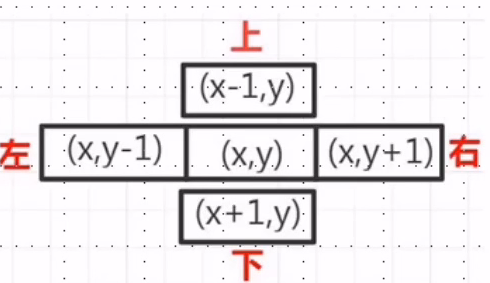Title Description
The labyrinth consists of N rows of M-column cells (n,m are less than 50), each of which is either empty or obstructed.
1 for open space 2 for obstacles
Now please find a shortest path length from start to end

Input Format
The first row input n,m means there are n rows and m columns
Next, type 1 and 2 for open space and obstacles, respectively
Finally, enter the coordinates of the start and end points
Output Format
Output Shortest Path Length from Start to End
sample input
5 4
1 1 2 1
1 1 1 1
1 1 2 1
1 2 1 1
1 1 1 2
1 1 4 3
sample output
7
Solution 1 (DFS)
Algorithms:
1. Search for a new node from the start in the order of right, bottom, left and top
2. Mark the new node as visited, repeat the first step from this node, and mark the node you just visited as not visited (required for backtracking)
3. When you reach the end point, go back.
Note: After the new node has been accessed and traversed, mark the node as not visited.
#include<cstdio>
using namespace std;
int m,n,endx,endy,min=999;
int a[100][100];//1 for open space 2 for obstacles
int v[100][100];//0 means no access 0 means access
int dx[4]={0,1,0,-1};//Four directions, right, bottom, left, top
int dy[4]={1,0,-1,0};
void DFS(int x,int y,int step)
{
if(x==endx&&y==endy)
{
if(step<min)
min=step;
return;
}
//Search clockwise in order from bottom right to top left
for(int k=0;k<=3;k++)
{
int tx,ty;
tx=x+dx[k];
ty=y+dy[k];
if(a[tx][ty]==1&&v[tx][ty]==0)
{
v[tx][ty]=1;
DFS(tx,ty,step+1);
v[tx][ty]=0;
}
}
}
int main()
{
int startx,starty;
scanf("%d%d",&m,&n);
for(int i=1;i<=m;i++)
{
for(int j=1;j<=n;j++)
{
scanf("%d",&a[i][j]);//1 for open space 2 for obstacles
}
}
scanf("%d%d%d%d",&startx,&starty,&endx,&endy);
v[startx][starty]=1;
DFS(startx,starty,0);
printf("%d",min);
return 0;
}Solution 2 (BFS)
algorithm
1. Enter the starting point into the team
2. Queue entry with movable points at the head of the queue
Queue the first node if there is no point to move
3. When looking for movable nodes, join the team in the order of right, bottom, left and top
Note: Set each node as a structure
* Visited points cannot be accessed again

The above figure is an example
Initially in the queue (x,y,step)
(1,1,0)
When step=1, the starting point is used as the node, all movable points are found to join the queue, and the nodes are queued
(1,2,1)(2,1,1)
When step=2, each point is queued as a node to find moving points and queue nodes
(2,2,2)(3,1,2)
When step=3, the same as the previous step
(2,3,3)(3,2,3)(4,1,3)
When step=4, the same as the previous step
(2,4,4)(5,1,4)
When step=5, the same as the previous step
(3,4,5)(1,4,5)(5,2,5)
When step=6, the same as the previous step
(4,4,6)(5,3,6)
When step=7, the same as the previous step
(4,3,7)
#Include <bits/stdc++. H>//BFS Search
using namespace std;
int a[100][100];//1 for open space 2 for obstacles
int v[100][100];//0 means no access 0 means access
struct point
{
int x;
int y;
int step;
};
queue<point> r;//Application queue
int dx[4]={0,1,0,-1};//Four directions, right, bottom, left, top
int dy[4]={1,0,-1,0};
int main()
{
//input
int n,m,startx,starty,endx,endy;
scanf("%d%d",&n,&m);
for(int i=1;i<=n;i++)
{
for(int j=1;j<=m;j++)
{
scanf("%d",&a[i][j]);
}
}
scanf("%d%d%d%d",&startx,&starty,&endx,&endy);//Start and end coordinates
//BFS
point start;//The starting point is the structure type
start.x=startx;
start.y=starty;
start.step=0;
r.push(start);//Enroll starting point
v[startx][starty]=1;
int flag=0;
while(!r.empty()){
int x=r.front().x;
int y=r.front().y;
if(x==endx&&y==endy)
{
flag=1;
printf("%d",r.front().step);
break;
}
for(int k=0;k<=3;k++)
{
int tx,ty;
tx=x+dx[k];
ty=y+dy[k];
if(a[tx][ty]==1&&v[tx][ty]==0)
{
//Entry
point temp;
temp.x=tx;
temp.y=ty;
temp.step=r.front().step+1;
r.push(temp);
v[tx][ty]=1;
}
}
r.pop();//After the move is complete, the first element needs to be queued
}
if(flag==0)
printf("no answer");
return 0;
}